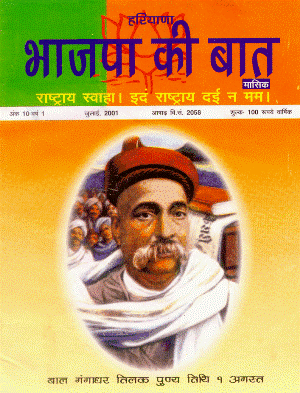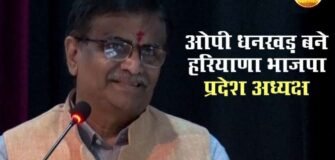ECONOMIC STRUCTURE SUITED TO NATIONAL GENIUS » Bhajpa Ki Baat
Share

By Pt. Deendyal Upadhyaya
Yesterday we had discussed the functions of the State in a Nation. According to the Bharatiya traditions, a Nation is an organic living entity which has come into existence on its own and has not been made up of, or created by, any group of persons. A Nation brings forth a variety of institutions to fulfil its needs, as well as to give concrete shape to its inner fundamental nature. The State is one of these institutions, which, though an important institution, is not supreme.
In our ancient literature, wherever the duties of a king are referred to, his importance is definitely recognised. This is so, perhaps, to make him realise his immense responsibility. He exercises tremendous influence on the lives and character of the people. Hence, he has to give due attention to his own behaviour. Bhishma has said the same thing in the Mahabharata, when he was asked whether circumstances make a king, or a King makes the circumstances. He categorically stated that the King shapes the circumstances. Now some persons interpreted this to mean that he considered the king above all. But this is not true.
He did not suggest that the king was above Dharma. It is true that the king wielded a great deal of influence, and that he was a protector of Dharma in society, but the king could le what constitutes Dharma. He only saw to it that People led their lives according to Dharma. In a way, he was eqivalent to the present day executive.
Responsibility of the Executive
In a modern state, the executive has the responsibility to execute the laws properly, but it does not enact laws. When the executive does not function with honesty and efficiency, the laws are entirely disregarded, as we may well see around us. And we can well say today, “Executive is responsible for the present evils to a great extent”. After all why has prohibition failed? Who is responsible for its failure? When those very persons, who have been entrusted with the task of implementing prohibition, start taking monthly pay-offs from the bootleggers, how will the prohibition policy succeed? The executive is therefore, responsible for the proper enforcement of the law. This is the meaning of Bhishma’s statement. It would be a mistake to interpret it as an acceptance of proven supremacy of a king. If this were so, how was it that the tyrant king Vena was removed by the Rishis and Prithu enthroned in his place? This action by the Rishis was never condemned by anyone in history. On the contrary, it was hailed by everyone. When the supremacy of Dharma is accepted as a principle, then through the authority of Dharma, the Rishis derive a right to remove a king who defaults in his duty. Otherwise, it would have been absolutely illegal to remove a king from his throne. Thus, if a king does not act according to Dharma, it becomes the duty of everyone to remove him. In Western countries, either a king was removed by some other king, or people rejected the sovereignty of the king altogether. Their king was a representative of God and could under no circumstances be removed at least in principle.
Various Institutions in the Social set Up
In Our socio-political set up, the king and the State were never considered supreme. Not only that, there were other important institutions (besides the State, which was only one of them) to regulate and to help carry on the social life. Those institutions had been organised both on a horizontal and vertical level, i.e. on regional and occupational basis. We had evolved Panchayats and Janapada Sabhas. The mightiest of the kings did not ever disturb the Panchayats. Similarly, there were associations on the basis of trade. These two were never disturbed by the State; on the contrary, their autonomy was recognised. They devised their own rules and regulations in their fields. The Panchayats of different communities, shrenis, nigams, Village Panchayats, Janapada Sabhas and other such organisations, used to frame their own rules and regulations. The function of the State was mostly to see that these rules were observed by the persons concerned. The State never interfered with the affairs of these associations. Thus, the State was concerned only with some aspects of the life of the society.
Similarly, in the economic field, many institutions are created. We have to think what should be the nature of our economic structure. We must have such an economic system that helps in the development of our humane qualities or civilisation, and enables us to attain a still higher level of all round perfection. We should have a system which does not overwhelm our humane quality, which does not make us slaves of its own grinding wheels. According to our concept, man attains God-like perfection as a result of development. Therefore, we have to devise such an economic system, to create such infrastructure and to frame such regulations, in which and by which, the inherent potentialities of man may find their highest fulfilment. Let us consider this point.
We must have such
an economic system
that helps in the
development of our
humane qualities or
civilisation, and enables
us to attain a still higher…
Limitation of Economic System
An economic system must achieve the production of all the basic things essential for the maintenance and development of the people, as well as the protection and development of the Nation. Having satisfied the basic minimum requirements, the question naturally arises whether there should be more production for greater prosperity and happiness. Western societies consider it most essential, and even desirable, to go on continuously and systematically increasing the desires and needs of man. There is no upper limit in this context. Normally, desire precedes the effort to produce the things desired. But now the position is reverse. People are induced to desire and use the things that have been or are being produced. Instead of producing to meet the demand, the search is on for markets for the goods already produced. If the demand does not exist. systematic efforts are made to create demand. This has become the chief characteristic of the Western economic system. Earlier, production followed the demand; now demand follows the production.
Consider the use of tea, for example. Tea was not produced because people desired and wanted it. But tea was produced and we were induced to develop a taste for tea. Now tea is a common man’s drink. It has become a part of our life. The case of vegetable ghee is similar. Did anyone ever want to use it? It was first produced, and then we were taught to use it. If whatever is manufactured is not consumed, there will be depression. Some of us may remember the Great Depression of 1930-32. There was abundance of goods at that time, but there was no demand. Therefore, factories had to be closed down. Bankruptcy and unemployment were widespread. Thus nowadays, it is most important that what is being produced must be consumed.
To be continued…
Speech delivered by Pt. Deendyal Upadhyaya on 25 April, 1965 in Mumbai
(Source- Integral Humanism-An Analysis of Some Basic Elements)
Related
(News Source -Except for the headline, this story has not been edited by Bhajpa Ki Baat staff and is published from a KS feed.)
















